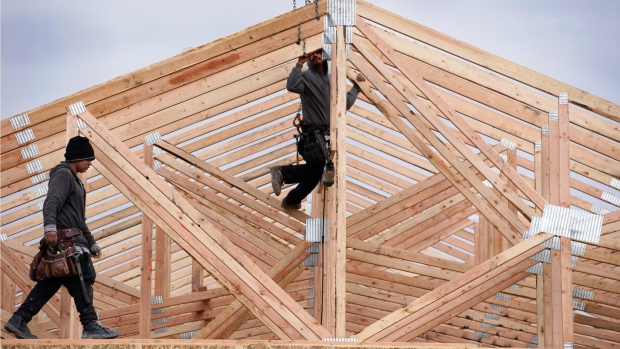
US Small-Business Rent Delinquencies Rise to a Three-Year High
The delinquency rate for US small businesses climbed to a three-year high this month, reflecting the impact of rent spikes and declining revenue, according to a monthly survey.
Latest Videos
The information you requested is not available at this time, please check back again soon.

The delinquency rate for US small businesses climbed to a three-year high this month, reflecting the impact of rent spikes and declining revenue, according to a monthly survey.

Apollo Global Management Inc., KKR & Co. and Stonepeak may inject billions of dollars into a joint venture that will help fund Intel Corp.’s semiconductor fabrication facility in Ireland, according to people with knowledge of the matter.

Cava Group Inc. is planning to further expand its footprint in the Chicago area and other areas of the Midwest, making a contrarian bet that the region will reverse population declines that have plagued it in recent years.

Donald Trump’s lawyer at his “hush money” trial sought to cast doubt on claims that a tabloid publisher’s $150,000 deal with an ex-Playboy model to keep quiet about an alleged affair was an attempt to influence the 2016 election.

Mexican companies are pushing ahead with plans to sell shares, seeking to tap renewed interest from global equity investors, according to the head of Barclays Plc in the country.
May 2, 2019
The Canadian Press

TORONTO -- Ontario is proposing to make it easier to build secondary suites and rental housing as part of efforts to increase supply, but parallel changes to a land tribunal were decried by critics as favouring developers over communities.
Municipal Affairs and Housing Minister Steve Clark introduced legislation Thursday that includes a host of changes aimed at improving speed and costs in creating housing, as well as promoting a mix of housing types.
"We will address the 'missing middle' shortage by making it easier to build different types of housing -- from single, detached homes, to townhouses, to mid-rise rental apartments, second units and family-size condos," he said.
"We need to encourage builders to build the types of housing people actually need."
The government is proposing to eliminate a charge for creating a second suite in new homes and allow homeowners to create units above garages or in laneways.
Charges for building rental and not-for-profit housing would be deferred, allowing the developer to pay in instalments over five years. The municipality would be able to charge interest.
The Ontario Home Builders' Association said the changes announced Thursday would remove barriers to providing more housing.
"The province's Housing Supply Action Plan lays the groundwork for more homes to be built, which leads to more choice and affordability," CEO Joe Vaccaro said in a statement.
The Local Planning and Appeal Tribunal, which replaced the Ontario Municipal Board, would also be given more powers to manage and decide cases in order to reduce delays.
The former Liberal government overhauled the independent tribunal that adjudicates planning and development disputes, giving it less power to overturn local government decisions.
Under the Progressive Conservative government's proposed changes, the LPAT would be able to hear appeals with fresh evidence for major planning decisions and make any decision that a municipality could have made.
Clark said the changes will reduce delays, along with adding more adjudicators. A backlog of cases has tied up about 100,000 units in Toronto alone, he said.
Green party Leader Mike Schreiner said Clark's proposed changes revive much-maligned OMB rules that "allowed deep-pocketed developers to run roughshod over communities."
"If there was any doubt that (Premier Doug) Ford was in the pocket of big developers, this removes all doubt," he said in a statement.
"It will once again force millions of dollars of legal costs upon municipalities, while transferring power from elected officials to a politically appointed board. Making matters worse, Ford is giving developers the right to appeal decisions, while depriving citizens from doing the same."
Liberal Nathalie Des Rosiers said the tribunal changes mean planning decisions will no longer reflect local priorities.
"This bill is a gift to developers that will leave communities worse off," she said in a statement. "It's clear the Ontario Municipal Board, which voters spend years trying to reform, is back."
As well, the government said it will remove the requirement for new homes to include the infrastructure for electric vehicle charging stations, in order to reduce costs.
The legislation also contains changes to the Cannabis Control Act to close what the government called a loophole that currently prohibits police from shutting down illegal dispensaries if the premises are being used as a residence. Officials said government has heard of cases in which people put bunk beds in a dispensary to make it look like a residential unit.